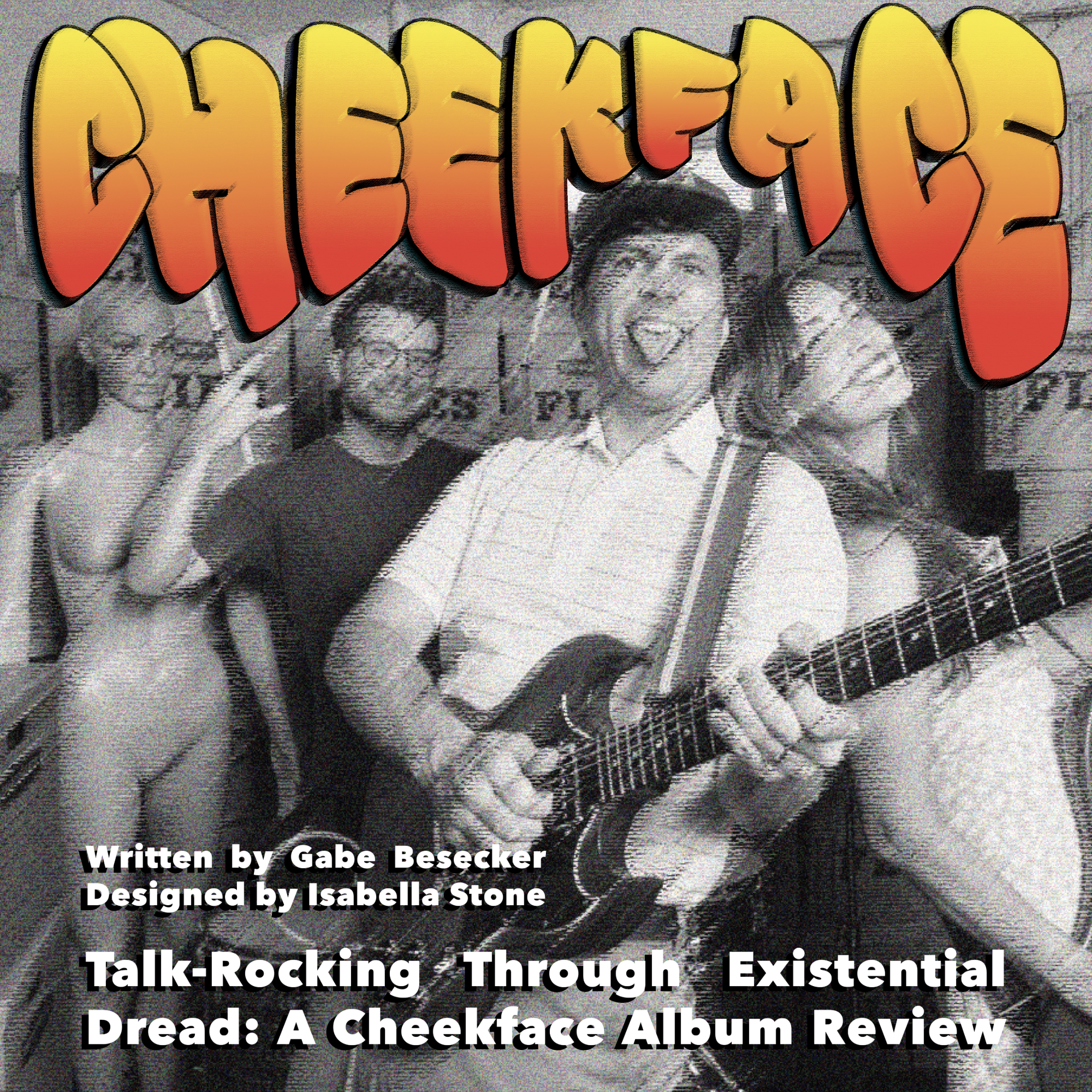
The above image describes this feeling pretty well.
Every morning, we are hit with a flurry of instability and anxiety as we navigate our public and private lives. Facing it all without a moment to collect ourselves drives us toward disillusionment as we slip further into apathy and comfort. Regardless, we try to do what we can, gritting our teeth and barely getting by so the floor falling behind us doesn’t catch up anytime soon.
Ironically, inspired by this disillusionment and disorder, Los Angeles-based indie rock band Cheekface recently released their fifth studio album, “Middle Spoon.” Using their signature mix of satirically smirky talk-singing, groovy basslines and gimmicks galore, “america’s local band” begrudgingly wades through all the nonsense and frustration while putting on the cheesiest, most childlike smile known to man.
As one might go through “Middle Spoon,” it may become apparent how absurd and frantic the album’s lyrical themes can feel. Cheekface’s explorations of internet slacker culture and political instability range from obtusely insightful satire to jokes at the expense of the listener’s attempts to analyze the lyrics. Similar to artists like CAKE, They Might Be Giants and sElf, Cheekface feels quite parody adjacent, so you’re bound to leave a song laughing, scratching your head or finding a new line to endlessly quote.
Cheekface feels like they’re playing a light-hearted game with their audience, seeing how far they can stretch the limits of what they can get away with while remaining in their niche-lyrical subject area. This is how we get groaners like, “So why not let me be your soy boy,” in “Growth Sux” as they try to cringe the audience out. At the same time, the song has amusing descriptions of difficulty talking about one’s issues: “Can I get a show of hands if you’re feeling discomfort? / But not if the discomfort is in your hands, or your arm, or your shoulder?” This creates a playful back-and-forth as the audience decides for themselves what works and what doesn’t.
Additionally, Cheekface often flips common cultural concepts and expressions on their head, such as “Cigarettes can kill you / But if they don’t they’ll make you stronger” or a detached, pro-oppressor reading of the biblical story of David vs. Goliath in “Living Lo-Fi.” These stand out as they provide a subversive yet satirical take on clichéd themes, forcing you to ponder aspects of modern cultural perspectives you may take for granted. Unfortunately, not all uses of this technique are the same and can lead to funny but vapid one-liners, such as “The squeaky grease will get the wheel” in “Hard Mode.”
While the fruits of these experiments can be entertaining, they can leave a lot to be desired in producing more cohesive themes. Often, I find certain songs going off-track because of their own gimmicks, prioritizing the feeling of the fun lyrical flow more than developing their interesting concepts. It’s especially prevalent in the second verses of “Art House” and “I Know What’s Gonna Happen,” where the songs abruptly switch gears to tangentially related subject areas. Not to say that deep, well-thought-out themes are necessary to make a good song or album, but I enjoy delving deeper into songs and was slightly disappointed with this one. But hey, the joke’s on me for trying, given Cheekface’s propensity for absurdist humor.
The instrumentation of “Middle Spoon” and its musical style are the largest departure from Cheekface’s other albums, which isn’t as dramatic a statement as it may seem — the last greatest change was giving the vocalist a high-quality mic with proper mixing. As you reach the middle of the album, Cheekface steps away momentarily from the lighter, CAKE-inspired grooves. Back-to-back, they bless us with “Rude World,” a ska, reggae groove that pairs well with Greg Katz’s talk-singing and “Military Gum,” a harder stadium rock instrumental under rapper McKinley Dixon’s straightforward verse. Cheekface has always had these influences in their music but rarely played them outright, so it was a nice change of pace to hear them honor their roots.
Otherwise, some highlights were “Don’t Dream” with its beautiful mixing of harmonies between the back-up and main vocals and “Content Baby”’s infectious discrete guitar line. The only song I felt was out of place on this album was “Growth Sux,” which is arguably one of the most grooveless songs I’ve ever heard. Given its themes of an awkward adolescent’s confusion between growth and remaining the same, I believe that may have been the point, but still…
Like their other albums, “Middle Spoon” clocks in at 33 minutes and maintains a consistent, medium-to-high space throughout, making the whole album feel fresh and lively (except “Growth Sux”). While retaining a similar pace and sense of continuity, the songs have enough variety in their lyricism, instrumentation and structure to keep you engaged while avoiding feeling like a slog to get through (except “Growth Sux”). Given this, this album has been the perfect ironically cheerful soundtrack for the tedious administrative work I have to do for different organizations. I could have listened to the album multiple times and still manage to find entertainment throughout (except for “Growth Sux”).
All in all, “Middle Spoon” is a great outing from Cheekface! Its cohesiveness, exploration of new musical ideas and perpetually chipper-cheerful energy came at the perfect time, as consuming any content online right now can feel exhausting and demoralizing. Cheekface reminds us to walk through the instability we see daily with our heads up and tongues firmly in our cheeks.